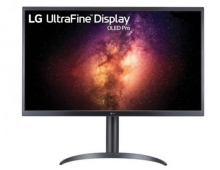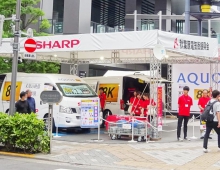
LG, Sharp, Chunghwa Say Guilty in LCD Case
Three leading electronics manufacturers - LG Display Co. Ltd., Sharp Corp. and Chunghwa Picture Tubes Ltd. - have agreed to plead guilty and pay a total of $585 million in fines for fixing prices of LCDs used in a wide variety of electronics, the U.S. Justice Department said Wednesday.
The charges were filed in U.S. District Court in San Francisco. The companies have agreed to cooperate with the Department's ongoing antitrust investigation.
Companies directly affected by the LCD price-fixing conspiracies are some of the largest computer, television and cellular telephone manufacturers in the world, including Apple, Dell and Motorola, according to the U.S. Justice Department.
LG Display Co. Ltd, and its wholly-owned subsidiary, LG Display America Inc., agreed to plead guilty to participating in a conspiracy from September 2001 to June 2006 to fix the price of TFT-LCD panels sold worldwide. During the conspiracy, LG Display Co. Ltd. was known as LG.Philips LCD Co. Ltd. (a joint venture between LG Electronics and Philips Electronics) and LG Display America Inc. was known as LG.Philips LCD America Inc.
Sharp Corp.,has agreed to pay a $120 million fine for its participation in separate conspiracies to fix the price of TFT-LCD panels sold to Dell Inc. from April 2001 to December 2006 for use in computer monitors and laptops; to Motorola . from fall 2005 to the middle of 2006 for use in Razr mobile phones; and to Apple from September 2005 to December 2006 for use in iPod portable music players.
Chunghwa, a Taiwanese TFT-LCD panel manufacturer, has agreed to pay a $65 million fine for its participation with LG and other unnamed co-conspirators in a conspiracy from September 2001 to December 2006 to fix the price of TFT-LCD panels sold worldwide.
Of the $585 million in fines, LG will pay $400 million, the second highest criminal fine ever imposed by the Department's Antitrust Division.
Sharp posted on its Web site that it "understands the gravity of this situation and will strengthen and thoroughly implement measures to prevent the recurrence of this kind of problem."
It also said that Sharp's chairman and CEO and some directors would return 10 to 30 percent of their compensation for three months starting in December.
The company said it would record the fine, which it estimated at 12 billion yen, as extraordinary expenses for the Oct. 1 to Dec. 31 period.
These pleas are the result of a joint investigation by the Antitrust Division's San Francisco Field Office and the Federal Bureau of Investigation in San Francisco. The plea agreements are subject to court approval.
Companies directly affected by the LCD price-fixing conspiracies are some of the largest computer, television and cellular telephone manufacturers in the world, including Apple, Dell and Motorola, according to the U.S. Justice Department.
LG Display Co. Ltd, and its wholly-owned subsidiary, LG Display America Inc., agreed to plead guilty to participating in a conspiracy from September 2001 to June 2006 to fix the price of TFT-LCD panels sold worldwide. During the conspiracy, LG Display Co. Ltd. was known as LG.Philips LCD Co. Ltd. (a joint venture between LG Electronics and Philips Electronics) and LG Display America Inc. was known as LG.Philips LCD America Inc.
Sharp Corp.,has agreed to pay a $120 million fine for its participation in separate conspiracies to fix the price of TFT-LCD panels sold to Dell Inc. from April 2001 to December 2006 for use in computer monitors and laptops; to Motorola . from fall 2005 to the middle of 2006 for use in Razr mobile phones; and to Apple from September 2005 to December 2006 for use in iPod portable music players.
Chunghwa, a Taiwanese TFT-LCD panel manufacturer, has agreed to pay a $65 million fine for its participation with LG and other unnamed co-conspirators in a conspiracy from September 2001 to December 2006 to fix the price of TFT-LCD panels sold worldwide.
Of the $585 million in fines, LG will pay $400 million, the second highest criminal fine ever imposed by the Department's Antitrust Division.
Sharp posted on its Web site that it "understands the gravity of this situation and will strengthen and thoroughly implement measures to prevent the recurrence of this kind of problem."
It also said that Sharp's chairman and CEO and some directors would return 10 to 30 percent of their compensation for three months starting in December.
The company said it would record the fine, which it estimated at 12 billion yen, as extraordinary expenses for the Oct. 1 to Dec. 31 period.
These pleas are the result of a joint investigation by the Antitrust Division's San Francisco Field Office and the Federal Bureau of Investigation in San Francisco. The plea agreements are subject to court approval.





















